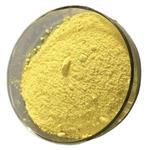Description
Menatetrenone (also known as MK-4) is a manaquinone compound and a vitamin K compound which can be used as a hemostatic agent as well as adjunctive therapy for the pain of osteoporosis. It mainly takes effects through modulating the signaling of certain tyrosine kinases, thereby affecting several transcription factors including c-myc and c-fos. It is capable of inhibiting tumor cells growth through inducing apoptosis and cell cycle arrest. It can be produced via the conversion of vitamin K1 inside the body including the testes, pancreas and arterial walls.
Chemical Properties
A yellow crystal is extracted from acetone-ethanol or methanol-chloroform. It has a molecular weight of 580.90 and a melting point of 51-52°C. It is insoluble in water but slightly soluble in oil. It dissolves well in ethanol, ether, acetone, benzene, chloroform, and other organic solvents. However, its solubility is slightly lower than that of vitamin K1. It decomposes when exposed to strong acid, oxidants, alkalis, and light.
Occurrence
Menatetrenone (vitamin K2) is widely found in green leaves and vegetables, and also in fish, meat, cheese and liver oil.
Uses
Menaquinones are isoprenoid quinones of the naphthalene series and belongs to the K2 Vitamin homologs. Menaquinones were originally discovered as the anti-hemorrhagic factor and now encompasses a variety of physiological processes. Menaquinone 4 has four isoprene residue in its side chain and is also commonly refered to as menatetrenone. Menaquinone-4 is the most common type of vitamin K2 and is known as a hemostatic agent and is used as adjunctive therapy for the pain of osteoporosis.
Definition
ChEBI: Menaquinone-4 is a menaquinone whose side-chain contains 4 isoprene units in an all-trans-configuration. It has a role as a bone density conservation agent, a human metabolite, an antioxidant, an anti-inflammatory agent and a neuroprotective agent.
Preparation
It can be extracted from millet leaves and rotten fish, and can also be synthesized with 2-menaquinone-1,4.
General Description
Menaquinone (K2), a vitamin K2 homologue with four isoprene units. It has been reported to enhance bone formation and plays a vital role in the production of blood coagulation factors.
Biochem/physiol Actions
Menatetrenone (MK-4) is one of nine forms of vitamin K2 which is ubiquitously present in extrahepatic tissues. MK-4 has a number of metabolic and anti-neoplastic activities.
References
https://pubchem.ncbi.nlm.nih.gov/compound/menatetrenone#section=Biomolecular-Interactions-and-Pathways
https://en.wikipedia.org/wiki/Menatetrenone






